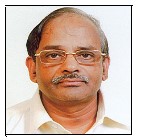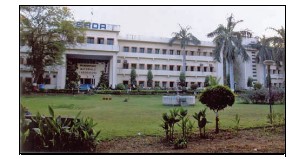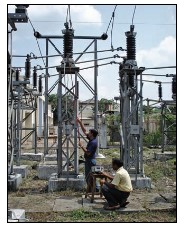 — T.P. Govindan, Director, Electrical Research &
Development Association (ERDA)
— T.P. Govindan, Director, Electrical Research &
Development Association (ERDA)
Electrical Research & Development Association (ERDA) is a
professionally managed not-for-profit technical organisation serving
industries and utilities for over 35 years in the areas of test,
evaluation, certification, consultancy and R&D related to electrical
products and systems.
T.P. Govindan shares ERDA's contribution
to the country and gives a glimpse of the organisation's future
plans. While maintaining that ERDA has earned a very good brand
image over the years, it is committed to further enhance the quality
of service and strengthen its R&D efforts in industry-relevant areas.
An interview by
Venugopal Pillai.
To begin with, please tell us about ERDA's mission and discuss in
brief how ERDA has grown over the past 35 years.
Electrical Research & Development
Association (ERDA) is a
professional organisation established in 1974 and registered under
the Societies Registration Act. The founding members, a group of
visionary industry captains, realized the need for an independent
and technically competent test, evaluation and R&D laboratory to
cater to the growing need of the industry and its customers in the
area of electrical products, materials and systems.
Their zeal and tenacity resulted in the formation of the
organisation. Acknowledging and realising the need of such a
laboratory, the Gujarat government supported the venture and
provided the necessary land and infrastructure at Vadodara and
provided certain financial grant for building the capital facility.
The Council of Scientific & Industrial Research (CSIR),
Government of India, supported the organisation with financial
grant in its initial stages.
Located in a sprawling 25-acre complex at Makarpura, an
industrial suburb of Vadodara, ERDA today has a customer base
of over 3,000 satisfied customers both nationally and
internationally. With a competent employee base of over 300,
ERDA is an autonomous, financially self reliant not-for-profit
organisation, professionally managed by a managing
committee consisting of senior personnel from the industry, the
Gujarat government, and CSIR laboratories, supported by
invited academic and industry experts.
From the financially challenging early times three decades ago
with a revenue earning of a few lakhs of rupees, ERDA has grown
over 1,000 times in the last three decades and has set its vision to
be a global service provider in its chosen area of R&D,
investigation, certification and knowledge promotion for the
advancement of technology capabilities of electrical products and
systems. All its actions and agenda emanate from this vision.
Please describe ERDA's facilities in Maharashtra, Gujarat,
Andhra Pradesh and Haryana, and tell us in brief about the
various testing routines that they are equipped to handle.
Equipped with many sophisticated and state of art facilities at its
two major Vadodara laboratories at Makarpura and Savli, many
of them best-in-class. ERDA is constantly looking at opportunities
to expand its professional services to new areas within its
charter. Its facilities and capabilities are accredited and certified
by many leading certification agencies across the world.
ERDA presently caters to customer
requirements covering a comprehensive
range of very small electrical gadgets to
large high voltage products upto 132kV-
220kV class. It can selectively evaluate
400kV class apparatus. It provides
complete certification and evaluation of
short circuit current capability upto 120kA
for low voltage products and systems. A
new sophisticated EMI laboratory that
evaluates the immunity and susceptibility
of apparatus to electromagnetic
interference (EMI) has been recently
commissioned. With many apparatus now
controlled electronically or digitally, this
evaluation facility will cater to the
reliability assessment of apparatus to
emerging needs.
ERDA has set up laboratory facilities at
various customer centers across India. It has recently acquired
a property at Rabale, Navi Mumbai, to expand its services in
Mumbai area. This facility will cater to Maharashtra and
neighbouring areas. In its laboratories at Sonepat and
Rajmundhry, services related to transformer diagnostics and
calibration of various products and systems are carried out.
ERDA is constantly looking at avenues to expand its services to
new customer base across India and internationally, which is
one of its prime growth strategies.
 There is a general perception that India lacks adequate testing
facilities, and that Indian manufacturers have to avail the
services of international agencies for testing of high-voltage
equipment. What is your view?
There is a general perception that India lacks adequate testing
facilities, and that Indian manufacturers have to avail the
services of international agencies for testing of high-voltage
equipment. What is your view?
India is self sufficient in many of the evaluation and certification
facilities. This is demonstrated by the vast customer base,
including overseas customers, availing services in our
laboratories. Many of the laboratories here in India are best-inclass.
There are few facilities, however, which need to be
upgraded. The country is gearing up in this area.
Given that India is expected to add around 15,000 mw of new
power generation capacity per year over the medium term,
supported by matching T&D infrastructure, do you foresee an
even more pronounced shortage of
equipment testing facilities?
Not exactly! This is being seen as a service
growth opportunity by the laboratories. The
Indian laboratories are competitive,
technically very competent, and the
customer response time is being
progressively bettered. We are gearing up to
cater to the increased requirements.
Please summarize ERDA's growth plans,
mainly in terms of increasing its competence
in the electrical equipment testing sphere.
ERDA has invested close to

100 crore in its
facilities with most of the growth
investments happening in the last decade.
ERDA has set its vision to be amongst the
best laboratories in the world. New facilities
are continuously being added and existing
laboratories upgraded. In the last year alone, ERDA added three
new laboratories to provide new services and reduce the
service cycle time of customers. A challenging annual growth
rate is being planned. Geographical expansion of ERDA
laboratories is on the cards. Internal competence building
exercises of our human resources are progressing further.
Large scale automation of test systems to enhance speed,
reliability and integrity of the services are planned. Business
Process Automation through ERP is being taken up.
India is seen moving to the 1,200kV UHVAC power transmission
regime. How involved is ERDA in this endeavour?
ERDA so far has not been in the area of UHV. As of now, it is not
equipped to directly and significantly contribute to this landmark
national pride project piloted by Power Grid Corporation of India.
While it salutes, along with the nation, this national facility
project of international class, it proposes to provide service to
the manufacturers of UHV apparatus related to R&D of new
materials and systems. UHV is an area of future thought at ERDA.
Please enlighten us about major technologies that ERDA has
developed for the power sector in recent years. In a general
sense, how successful has commercialization of ERDAdeveloped
technologies been?
Over the years, ERDA has developed over 50
technologies relevant to materials and
products. Over 25 of them have been
successfully commercialised through
transfer of technologies to technocrats. Low
voltage fault current limiter, transformer
protection device based on evolved gas, LED
based low cost portable lamp, etc are a few of
them. Many of them have won national
awards. ERDA has an IPR portfolio of over 15,
based on these developments. The
commercialisation rate has been
satisfactory so far. ERDA is now focusing on
high value technology developments with
active participation of end-users.
ERDA is reshaping its R&D structure and
mission programme to enhance its
involvement and contribution to national
mission projects, and industry-relevant midterm product
technologies. Renewable energy, advanced materials, power
quality, new product and process technologies, diagnostics and
life management of apparatus and systems are the new R&D
thrust areas.
 It is believed that research in the electrical and power industry
faces manpower constraints and that this field does not easily
appeal to students as a career choice. What is your view?
It is believed that research in the electrical and power industry
faces manpower constraints and that this field does not easily
appeal to students as a career choice. What is your view?
High quality, motivated and passionate manpower are the
primary requirements for a successful R&D industry. Academic
interaction needs to be of higher order to attract talent to the
R&D centres at the inception level. Active faculty-industry
association can help reduce the gap in this area. Generally, this
continues to be an area of concern since a long time and needs
improvement.
What type of government support would you recommend to
further ERDA's contribution to the power sector?
We are satisfied with the government support being received by
ERDA. The Gujarat government provides financial grant for
establishment of capital facilities on need and request basis.
Government of India provides support to R&D programme of
national relevance. In recent times, this support
has provided good impetus to initiate and
enhance ERDA's contribution to the nation.
We understand that ERDA has done a lot of
developmental work in the renewable energy
segment, mainly wind energy and micro
hydropower. Does ERDA's have plans for
solar power that is currently generating a lot
of interest from developers?
ERDA has identified renewable energy as one
of its technology mission programme of its
R&D. It is actively working on R&D programme
related to wind, hydrogen and hybrids through
MNRE-sponsored projects. R&D work on new
materials for storage of hydrogen, new
appliances such as hydrogen-based heating
system, and hydrogen-run engines are in
advanced stages of development. The work in this area is
contemporary and in line with any R&D programme in the world.
ERDA has recently established evaluation facility for solar based
panels. ERDA is yet to work on R&D related to solar power.
We learn that ERDA is involved with the Rajiv Gandhi Grameen
Vidyutikaran Yojana, the nationwide village electrification
programme. Please tell us more.
ERDA executes extensive consultancy contract programme in
the area of RGGVY and other similar initiatives of the utilities. It
evaluates the programme, supervises the execution, inspects
the products, conducts the technical loss evaluation of the
feeders and provides improvement suggestions.
To conclude, what are the three most important objectives or goals
that you would like to see ERDA attaining in the medium term?
ERDA has a very good brand image as a quality service provider
in the area of investigation, test, certification, consultancy and
R&D. Its medium term goals would be to further enhance the
quality of service it provides nationally and internationally;
geographically expand to reach out to new customer base
through existing and new services; and to further strengthen its
R&D in national and industry relevant areas.